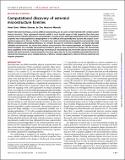Computational discovery of extremal microstructure families
Author(s)
Chen, Desai; Skouras, Melina; Zhu, Bo; Matusik, Wojciech
Downloadeaao7005.full.pdf (1.376Mb)
PUBLISHER_CC
Publisher with Creative Commons License
Creative Commons Attribution
Terms of use
Metadata
Show full item recordAbstract
Modern fabrication techniques, such as additive manufacturing, can be used to create materials with complex custom internal structures. These engineered materials exhibit a much broader range of bulk properties than their base materials and are typically referred to as metamaterials or microstructures. Although metamaterials with extraordinary properties have many applications, designing them is very difficult and is generally done by hand. We propose a computational approach to discover families of microstructures with extremal macroscale properties automatically. Using efficient simulation and sampling techniques, we compute the space of mechanical properties covered by physically realizable microstructures. Our system then clusters microstructures with common topologies into families. Parame-terized templates are eventually extracted from families to generate new microstructure designs. We demonstrate these capabilities on the computational design of mechanical metamaterials and present five auxetic microstructure families with extremal elastic material properties. Our study opens the way for the completely automated discovery of extremal microstructures across multiple domains of physics, including applications reliant on thermal, electrical, and magnetic properties.
Date issued
2018-01Department
Massachusetts Institute of Technology. Computer Science and Artificial Intelligence Laboratory; Massachusetts Institute of Technology. Department of Electrical Engineering and Computer ScienceJournal
Science Advances
Publisher
American Association for the Advancement of Science (AAAS)
Citation
Chen, Desai, Mélina Skouras, Bo Zhu, and Wojciech Matusik. “Computational Discovery of Extremal Microstructure Families.” Science Advances 4, no. 1 (January 2018): eaao7005.
Version: Final published version
ISSN
2375-2548